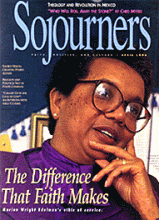In a time when rock-and-rollers are playing "unplugged," country-and-western singers are smashing their concert guitars, and the violin, upright bass, and mandolin may grace any stage, one thing is certain: The lines are blurring among American folk music and its rock, blues, and country cousins. Emerging musicians who draw on a variety
of influences have a unique opportunity to shine.
Folk musician Carrie Newcomer is ready. "Really early influences were Joni Mitchell and Janis Ian," she says. "But then again, I also grew up on AM radio, close enough to Chicago to listen to those wonderful soul stations. I just wanted to be one of Aretha Franklins back-up singers, you know?
"What you can call folk music anymore is really diverse," says Carrie, singer-songwriter and guitarist. Asked to define the folk tradition of which shes a part, she says, "Its about commonality. People from the genre tend to write very openly, approaching subjects that arent commercial. It can be something very personal, something political, something spiritual. Folk music tends to be about real human things on real human terms."
Warm and unpretentious, Carrie Newcomer is a talented and intelligent 30-something woman whose life has already given her much material for songs. "Ive done a lot of different things to support myself along the way," she says. "I worked in a factory. And Ive been a waitress way too many times."
Though pursuing music full-time now, she graduated from Goshen College in Elkhart, Indiana, with a degree in visual arts and a love for painting and small sculpture. Her musical interest began with the flute, but she switched to guitar in high school in order to sing as well.
Read the Full Article
